#critical analysis is IMPORTANT
Text
I, for one, think it’s incredibly sexy to ignore canon
#critical analysis is important and interesting and good#but also sometimes you just gotta write fanfic focused on the story YOU want to tell#and that’s okay too#we’re all just slapping plastic Barbie dolls together. it’s fine.
306 notes
·
View notes
Text
Public Service Announcement: Please, stay away away from HellYeahHeroes, Ubernegro, Chadfarsight*, KK4EverStuff, and Cohore.
*I'm aware Chadfaresight doesn't speak to HellYeahHeroes anymore but she's still responsible for spewing the very same toxicity.
HellYeahHeroes/HellYeahTeenSuperHeroes, Ubernegro, Chadfarsight, Cohore and others are the most vile, most pettiest, most hateful people who have no right to call themselves "comic fans".
[Trigger warning for screencaps in the links]
They will personally target comic writers using hyperbolic, personal attacks on them: Disgusting insults, making horrible assumptions of them like calling them "Hacks" multiple times, along with "Pussys", "eugenists", "homophobes", "perverts", "mysoginysts", "sex offenders", "cowards", "rape apologists", "fascist sympathizers", "Nazi apologists", "dog f***ers", telling them to "lick goats" and more.
The way they talk about writers like Jason Aaron, Jonathan Hickman, Ed Brisson, Matthew Rosenburg, Dan Slott, Donny Cates, Brian Michael Bendis, James Tynion IV, Scott Snyder, Joshua Williamson and others, it's clear that they hate them solely as people. In fact, they have held a deep personal hatred for them WAY before they read any of their works.
Yet they will happily mask what is clearly a bloody vendetta against people ,who never harmed them, under a smokescreen of "criticising crappy writing" and wanting their favourite characters "treated with respect".
KK4EverStuff has gone on to send death threats and wish harm upon creators, it's very possible HellYeahHeroes, Ubernegro, Cohore and Chadfarisght have done so too.
Please, report and block them. They are the most hate-filled toxic people to ever exist in the comic fandom.
Eventually, My friend Samasmith23 and I bumped into @Majingojira and told him HellYeahHeroes and co.'s behaviour since he is their friend. Because of his more chilled, open-minded attitude, we thought he would listen to us and condemn this behaviour but instead...
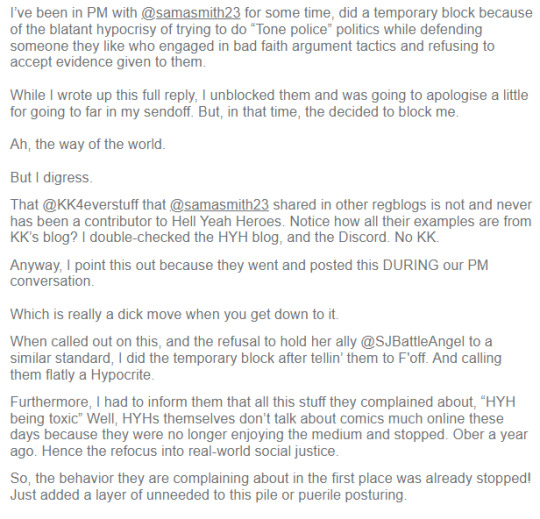
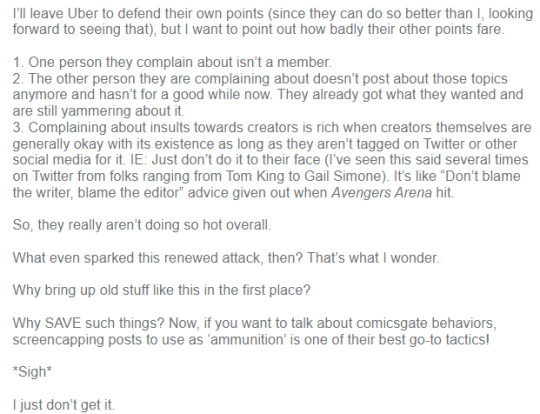
...he just kept shifting the goalposts; using whataboutisms: Like "Oh, HYH doesn't talk about comics anymore", "KK isn't a member of our group", "That was old stuff", "he (Samasmith) should hold SJBattleAngel to a similar standard", "Screencaps as ammunition is a C*micsgate tactic" and others.
He then suggested that I "fabricated" the screenshots.

But worst of all?



He made excuses for their abhorrent behaviour towards creators.
He dismissed our calls for acountability as "tone-policing", being "puritanical", operating under "Tumblr Morality" ect.
He even excused HYH and co's attacking of comic writers by saying: "Complaining about insults towards creators is rich when creators themselves are generally okay with its existence. Just don't do it to their face."
NO.
Calling for innocent creators to be fired is NEVER "okay"!
Telling them to "lick goats" is NEVER "okay"!
Attacking them as "perverts", "eugenists", "fascism apologists" is NEVER "okay"!
Encouuraging harrasment against them NEVER, NEVER "okay"!
Sending them literal death threats is NEVER, NEVER, NEVER "okay"!
Majingojira turns a blind eye to toxic fan harassment and, by doing so, enables it. Stay away from him.
I've wrote to multiple comic/nerd/fandom blogs on Tumblr, telling them about HellYeahHeroes's and his friend's toxicity; asking them to shame this sort of behaviour. But most never reply back. They probably think I'm some sort of "troll" trying to "start drama".
And I don't blame them, HellYeahHeroes, Majingojira, Ubernegro and others are some of the most beloved, well-respected comics/social justice bloggers on this website, I understand looking up to someone thinking they could never do any wrong.
I know because I was once one of those people.
You know, this takes a toll on my mental health: Trying to tell people that some of the most revered members of our communities are actually horrible pieces of work, but they don't believe you.
It's like being trapped in a room all alone, with no door. You scream the truth at the walls, hoping a door will appear.
But it never does, and you're stuck forever with no-one to hear your cries.
And it hurts. This pain of never being believed.
I hope you all understand.
I just want our community to be safe and healthy.
Please, believe me.
Dear @Hellyeahheroes, @ubernegro, @farsight-the-char @Cohore,
The way you targeted and demonized creators like Dan Slott, Tom King, Donny Cates, Jonathan Hickman, Ed Brisson, Matthew Rosenburg, Grant Morrison, Jason Aaron, Brian Micheal Bendis, Adam Glass, Tom Taylor, Scott Snyder, James Tynion IV, Joshua Williamson, Rian Johnson, Neil Druckman was just disgusting and horrible.
You have every right to dislike their work but to personally attack and vilify them is unacceptable!
They are not "misogynists", they are not "creeps", "they are not "racists", they are not "antisemites", they are not "eugenists", they are not "fascist sympathizers", they are not "Nazi apologists", they are not "closeted Neo-Nazis" but most of all: They are not "hacks!"
To @Hellyeahheroes, @ubernegro, @farsight-the-char, @Cohore,: Seeing your disturbing parasoical hatred of creators like Slott, King, Cates, Hickman, Brisson, Rosenburg, Aaron, Bendis, Snyder, Tynion Williamson, it's clear that outside of comics, way before you read any of their work you've always held a personal vendetta against them as people.
Why? Did they personally hurt you or your loved ones? Did they ruin your lives? Even if they did, that gives you no right to email them countless death threats!
I don't know what you think but personally attacking these writers and sending them death threats will not magically undo the likes of One More Day, Robin: One Year Later, Avengers Academy: Arena, Avengers Undercover, Heroes In Crisis! No! Your actions are the very reason people see nerd fandom as a toxic cesspool of bullying and entitlement. And you're just proving them right!
Apologise, do better or leave.
Tell Lily Orchard, CinemaSins and Mr. Plinkett I said hi.
#fandom#fandom culture#fandom discourse#fandom discussion#marvel#dc#comics#comic books#marvel comics#dc comics#comic book fans#fandom things#fandoms#psa#this has been a psa#important psa#signal boost#discourse#media criticism#media analysis
110 notes
·
View notes
Text
A "Brief" Analysis of Religion and Johnny Joestar
Introduction
I would be remiss not to begin by addressing Stone Ocean. I believe SO was where Araki really began playing with the idea of faith. Enrico Pucci is a priest, and his outfit is emblazoned with a giant cross. While there is something to be said about Pucci's repurposing of religion to suit his own goals (there are several good discussions of Pucci's character with relation to his faith that others have made, though I don't have them on hand), for my purposes there are only two aspects of Pucci's connection to Christianity that are relevant here:
a) His actual religious faith is somewhat disingenuous (Pucci listens to Dio's Heaven Plan because it serves his own aims - like Hot Pants)
b) He belongs to organized religion (introduced in a church, works in a prison chapel, 'Father' Pucci)
And one aspect of his character that is relevant:
a) He fully believed the Heaven Plan was righteous and would be a boon to humanity
Given that Pucci is the villain of the part, I think it's safe to say that we are supposed to take away that all of these are negative qualities.
I bring this up specifically to juxtapose SO's depiction of Christianity to SBR's. Steel Ball Run is a natural evolution of Stone Ocean's religious theming that represents both a critique and affirmation of faith. This analysis will focus on the character I think best represents SBR's religious themes: Johnny.
Unlike Pucci, Johnny's faith isn't immediately obvious. He wears no crosses and, if it weren't for his own narration, we likely wouldn't know he was religious. After all, Jesus appears to multiple people throughout the part, not just Johnny. It is possible to reduce Jesus' manifestation to simply being the work of corpse parts, but working in tandem with Johnny's character, it becomes plain there's stronger themes about Christianity and religion at work in the narrative.
(It's also very telling when even ten years later (as seen in Jojolion Chapter 22: Morioh, Year 1901) one of the few panels we get of Johnny is him in prayer.)
Johnny's character is extremely rich, but for this analysis I'll choose one of the more prominent overarching themes for his arc: the search for forgiveness. The concept has another name too - redemption. I'll be using them interchangeably.
Section I - An introduction to Johnny Joestar
I'll start with a quick rundown of Johnny's backstory.
Here's a few panels to representative of George's parenting:


And here's a few of Nicholas. After several panels of darkness, from Johnny's POV we're given this:

Johnny admires him greatly, but already feels a great sense of inferiority toward him.
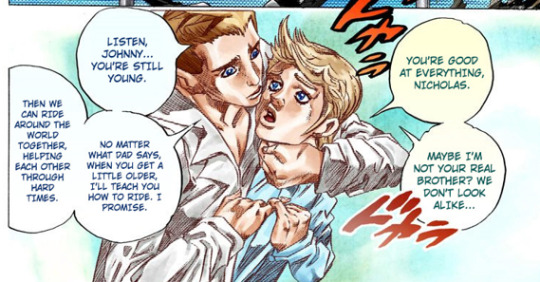
"Maybe I'm not your real brother?" Gee, I wonder who put that in his head.
Here's what we learn about the Joestar family:
(a) George Joestar is a Grade-A asshole. This will be a running theme.
And (b) Nicholas was everything to Johnny.
I want to point out this panel:
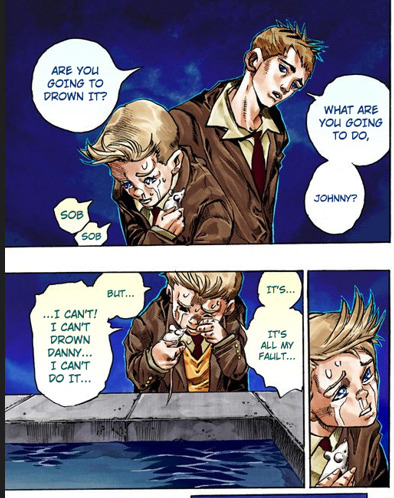
Even with George essentially physically threatening him to kill his pet, Johnny's kindness still wins out. His kindness toward animals is a consistent trait and also functions as indicator that, at some point in the past, he was far less aloof than he is in SBR. As readers, we find out this is because of Nicholas' death, which Johnny believes himself to be responsible for.
Johnny's perception of his own guilt in the accident is not helped by George's constant criticizing and reinforcement of Nicholas' amazingness:
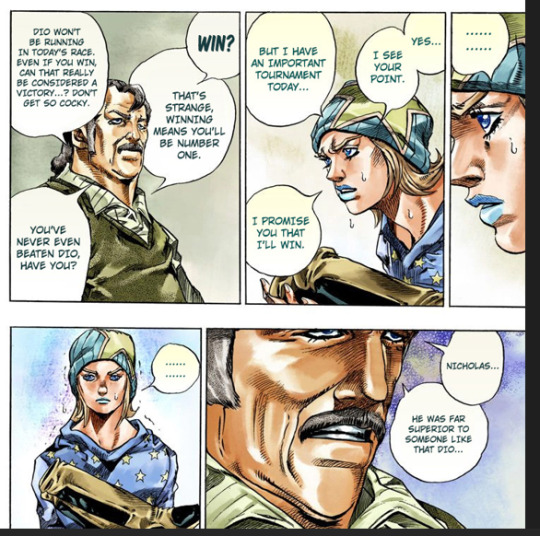
It is made abundantly clear that Johnny isn't good enough for George.
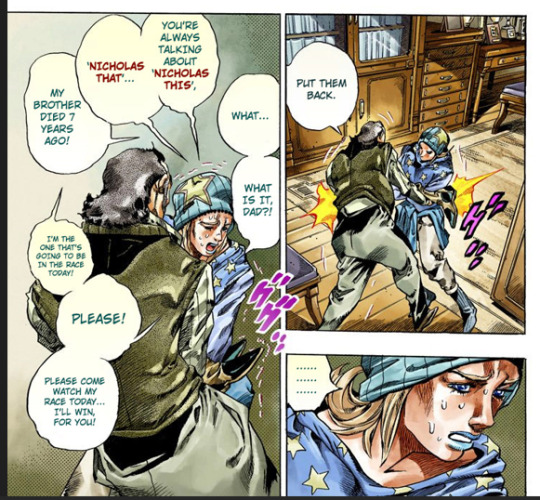
And Johnny never will be good enough. He's already the youngest person to ever win the Kentucky Derby (one of the qualifying races for the Triple Crown, which it's previously stated his father won several times) but George doesn't care. You can explain this with grief, but it seems clear that Johnny was always the unfavorite. Nicholas' death just cemented things.
The death of his brother and his relationship with George severely damaged Johnny's beliefs about himself.
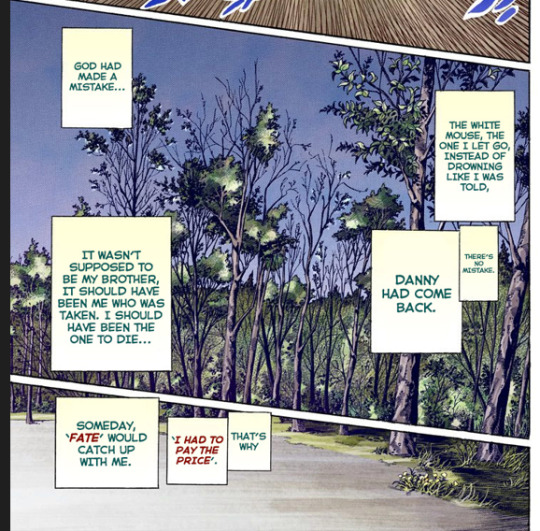
Chapter 42: A Silent Way (Part 2)
From a very young age, Nicholas' death caused Johnny to perceive himself as a murderer, willing or not. In other words, he has almost always considered himself a sinner. The 'sin' he committed of killing his brother is why he believes he is undeserving of happiness (Cain and Abel anyone?).
Because he is a 'sinner' - an unforgivable sinner - Johnny cannot fathom his life through any other mechanism but karma. He will always deserve the awful things that happened to him, because his sin is too great to forgive. God just hasn't noticed his mistake yet.
Section II - Broader themes in SBR
These are two main themes I will discuss here:
Individualism
2. Religion
My discussion on individualism in SBR will be limited to its connection to the religious theming. If you want a more in-depth look at this theme in general, check out this video.
As noted above, in Stone Ocean Father Pucci was a member of organized religion. Yet his faith was not truly in the church, but in the 'Heaven Plan', the completion of which would enable people to know their fate. They could not deviate from their set course, but the intention was that they would be able to find 'peace of mind' in that idea. This is how things are supposed to be.
We can also look at the Heaven Plan through the lens of "God has a plan for you". No matter what struggles you endure, you are supposed to be able to find comfort in the idea that some unknowable thing has it all taken care of. Is it a trial of your character? A test of your faith? If you accept God has a plan, then no matter what happens you can be assured you made the right decision (and alleviate your guilty conscience). If you live your life according to the Bible, then you have nothing to fear. If your life sucked in particular, then don't worry, because Heaven's waiting. Faith is based on the idea of "hope". That's what a prayer is - hope that someone is listening.
These ideas of religion and God's plan (i.e. fate) are also present in SBR, in a more subtle capacity. Most obviously, we have the corpse parts. The corpse is understood to be an object of power and value by most everyone in the story.
Here are a few panels of how different characters perceive the corpse.
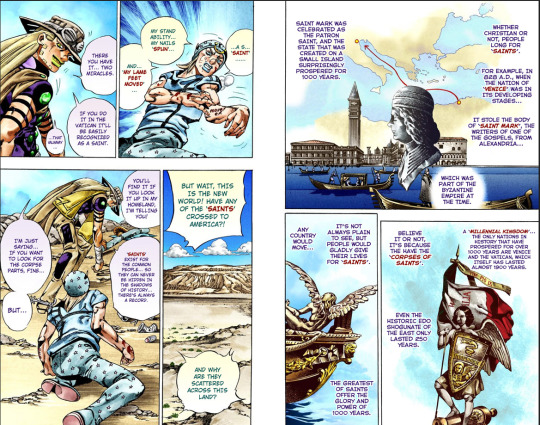
Chapter 27: Tusk (Part 3)
Gyro understand the corpse in the capacity of its ability to grant power and glory to the nations of the world. Still, he acknowledges "saints exist for the common people".

Chapter 57: Civil War (Part 2)
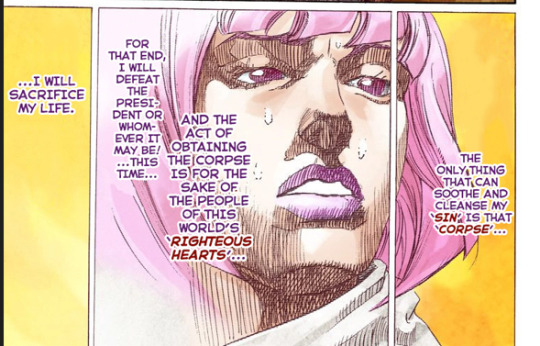
Chapter 75: D4C (Part 8)
Hot Pants initially seems to have a similar impression of the corpse as Gyro. However, as the story progresses, we learn that they and Johnny's motivations to collect the corpse are quite similar. The difference is that while HP wants the corpse for themselves (to earn forgiveness), they believe they can accomplish this forgiveness by giving the corpse to a higher cause (the Vatican). Hot Pants, too, acknowledges that the miracle of the corpse is supposed to belong to the people.
Meanwhile, Valentine uses the corpse as proof of the 'napkin law'. Whoever has the corpse will have the power to influence the rest of the world. This is representative of religion as an influencer and indication of power.
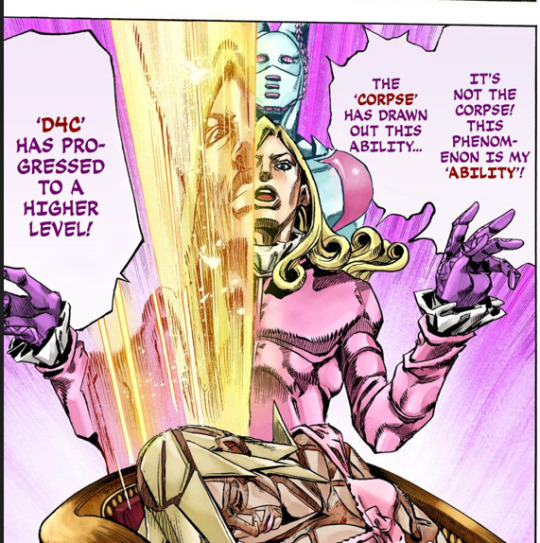
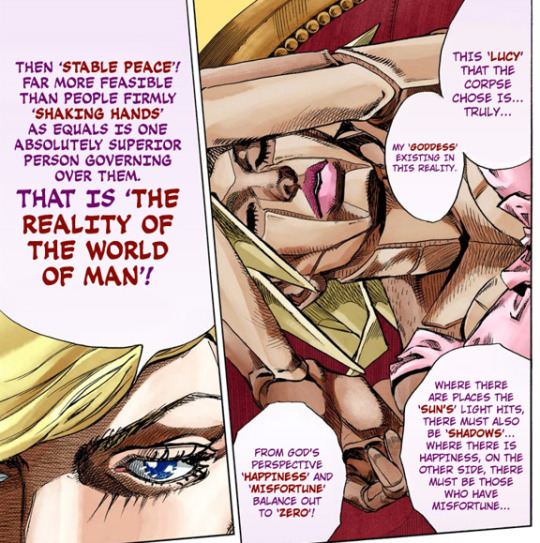

Chapter 78: D4C (Part 11)
Valentine quite literally claims the power of the corpse - the power to control the right to good fortune, to decide who deserves good things and who doesn't - as his own. He even decides this power doesn't belong to the corpse, but was his all along, his own potential just waiting to be drawn out. He compares this new ability to that of God himself. Valentine is putting himself in the position of God.
All of these characters consider the corpse in terms of what it means to a larger cause. The corpse, and thus religion, is a tool to grant power to those who possess it. It enables whatever entity possessing it to impose "God's plan" (I use that liberally) onto others, supposedly for their own good. Even HP, who has the motivation closest to Johnny's own (even mirroring his 'any means necessary' approach), still views the corpse in terms of its wider applicability. These viewpoints are starkly contrasted by Johnny's own; he just wants the corpse to be able to walk again. Johnny's motivation is very base, but out of the everyone in the cast, it is the humblest and I would argue the most sincere. It's a wish that would affect only himself. The corpse - and thus religion - is something deeply personal to him.
This relatively deterministic stance on religion - as a power related to fate and a tool to control the fates of others - would be in strong contrast with SBR's individualistic themes, were it not for Johnny.
Section III - Understanding Johnny's Search for Redemption
Now I will take a moment to address the unfortunate elephant in the room, namely Araki's treatment of Johnny's disability as a metaphor. I'm not happy with it, and I think magically healing his injury was kind of bullshit when the narrative had reached a point and almost spelled out that it wasn't necessary, but it is what it is so I'll be discussing his disability in this essay in that capacity.
On a related note, I’ll say something kind of controversial: Johnny’s hunt for the corpse was never really about his legs, though that was certainly part of it. As discussed in my Civil War analysis, the parallels between HP and Johnny reveal something else: narratively, gathering the corpse is shortcut to characters earning forgiveness. I’m not sure Johnny himself realized it before Philadelphia, but at some point the corpse became less about his disability and more about spiritual redemption. Healing his legs is representative of cleansing himself from his 'original sin' of "killing" Nicholas.
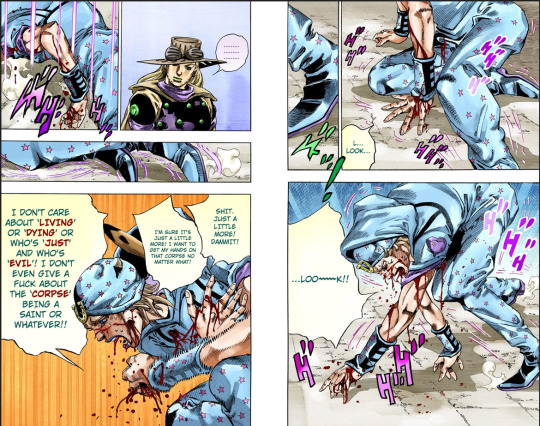
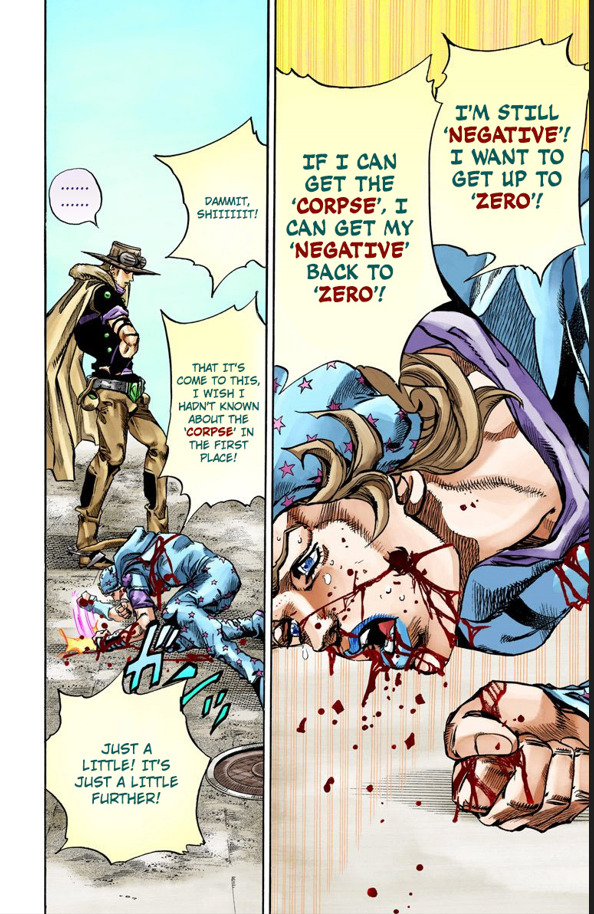
Chapter 72: Ticket to Ride (Part 2)
Johnny perceives his shooting as the ultimate payment for Nicholas' death. He ran from George after their falling out, pretending he was living the good life without actually forming genuine relationships with anyone. He ran from the guilt he felt toward Nicholas' death for even longer, only recently truly facing his trauma in the Civil War arc. His disability prevented him from being able to run away anymore and forced him into further isolation. It was the final proof he needed that he is someone not allowed to be happy - not allowed to be forgiven. As he is, he's not worth anything to anyone. That's why he's so desperate to walk again. Johnny has been in the 'negative' his entire life. The corpse granting him mobility would be the ultimate proof that he is a person worth healing / saving.
I'll also suggest that his statement of "not giving a fuck if the corpse is a saint or whatever" is less how he feels about religion and moreso about the apparent reverence everyone around him has for it, namely Hot Pants, Valentine and even Gyro. They all believe the corpse to be something valuable because of what it means to a larger cause or organization. For Johnny, it's a means to an end. At this point in the story, it's become clear that the one thing Johnny wants most of all is to be forgiven for his 'sin' - a chance to wipe the slate clean.
Section IV - Johnny and Faith
Firstly, Johnny was raised in a religious household. As seen above, his father is obviously religious to some extent, and when Gyro initially questions him about the corpse he's able to list off a few Saints.
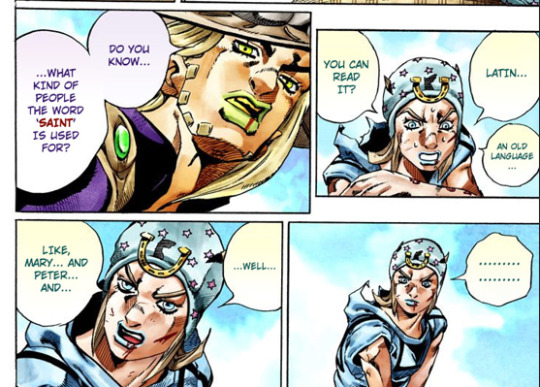
Chapter 27: Tusk (Part 3)
At the same time, however, I believe there's enough evidence to suggest he's in a crisis of faith. As per evidence I'll show later, he may simply think God has abandoned him like everyone else.
I'll move on to Johnny's perception of himself and how that relates to the religious themes in the story.
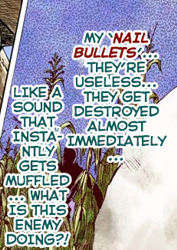
Chapter 41: A Silent Way (Part 1)
Stands are reflective of their user's fighting spirit, or, more literally, their soul. Tusk's bullets being destroyed so quickly is reflective of the weight of Johnny's guilt against his goal of forgiveness. At this point, Tusk is still in Act 1. Johnny feels any progress he makes towards forgiveness simply... fizzles out. Forgiveness means he can be happy, but he can never be truly happy because he has always been a sinner.

The dinosaurs here function as a metaphor for Johnny's guilt (isn't that a sentence?). He was able to start down the road to forgiveness through the hunt for the corpse parts and gaining Tusk, but at this point he still doesn't feel like he's truly earned the right to have them. 'Fate' will catch up with him before he can be forgiven, because he doesn't deserve to be forgiven.
Contrary to popular readings, as much as Johnny appears rather cold most of the time, he's actually an extremely caring person. His kindness with Danny backfired on him in a big way, which I why I think he tries to shut down the softer part of himself so hard, but it still comes through. We can see it in his loyalty to Gyro, putting up with his jokes and even playing along, as well as putting his life on the line to protect him several times when the easier option would have been to run away. He feeds the stray wolf in Wrecking Ball because he felt bad for it. He's also one of the only people to be genuinely kind to Lucy, even defending her to Gyro and protesting her involvement in the corpse hunt. Think about that - Johnny, Mr. "Get the Corpse at any cost" Joestar, was obviously willing to put Lucy's safety before his determination to get the corpse. Much of his coldness can be attributed to walls he built due to those he cares about frequently abandoning him, voluntarily or otherwise.

Chapter 42: A Silent Way (Part 2)
And if everyone has abandoned Johnny - because he has never been worth anything, because he is a sinner - then God surely has too. Very early in his life, he closed himself off to other people (and we can infer, by extension, closed himself off to God).
Because of this - because of his lack of connections to others, because of his low self-worth, because he feels he isn't someone who deserves happiness - Johnny's conviction to collect the corpse parts frequently wavers.
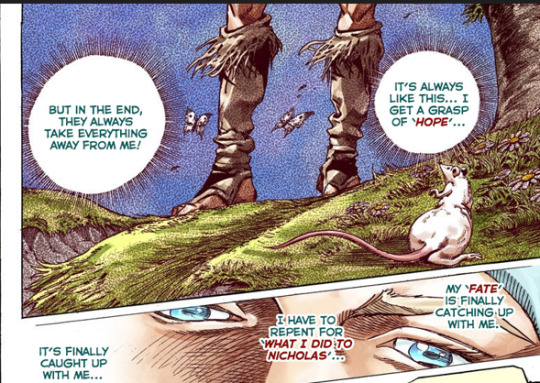
Chapter 44: A Silent Way (Part 5)
His 'dark determination', first seen in True Man's World, demonstrates that he does have the motivation to collect the corpse parts at any cost. At the same time, A Silent Way highlights his tendency to give up on himself. That's the struggle he must overcome in that arc. Johnny must harden his resolve, because despite still feeling like he doesn't deserve anything, he does want the corpse parts so that he can be someone worth something - to Gyro, at the very least. And because of his strengthening bond with Gyro, Johnny finds the resolve to fight on not just for Gyro, but for himself as well, evolving Tusk into Act 2. Even so, at the end of this arc, Johnny is still wavering. His still isn't sure of his worth because he has yet to pay for his 'sin'. Deep down, he believes he is not and never will be worth forgiveness.
But he keeps trying.
Johnny is the first to explicitly recognize the corpse as Jesus Christ, and Johnny is the only one to whom Jesus speaks directly and addresses by name.


Chapter 58: Civil War (Part 3)
As discussed in my Civil War analysis, his connection to Jesus, and Christ's words to him, are critical in Johnny realizing that Nicholas' death was not his fault. At the end of the arc, Johnny is purified, because Nicholas' death was never his sin to bear. Furthermore, despite threatening it several times, Johnny has never murdered in cold blood. Each and every time was self-defense against Valentine's minions (ironically, Gyro probably has a higher kill count.) When Axl Ro kills Johnny, his old self quite literally dies, and he is reborn purified of past sins (hey, that's a familiar story).
What we learn here is that it was the one man who was collecting the corpse - again, representative of a shortcut to forgiveness - for his 'selfish' goal of spiritual redemption that Christ deemed worthy of showing himself too. By reading Civil War as Johnny reconnecting with his faith through finding forgiveness for his sins in both himself and Christ, we understand that he isn't wavering anymore - now, he does believe himself someone worthy of redemption. But even with his faith in God and Christ solidified, Johnny still believes he hasn't been completely forgiven, as his legs are still not healed. Hence why he fights so desperately to reclaim the corpse in the D4C arc.
Section V - The Two Sides of Religion
First, the corpse siding with Valentine causes Johnny to have another crisis of faith.
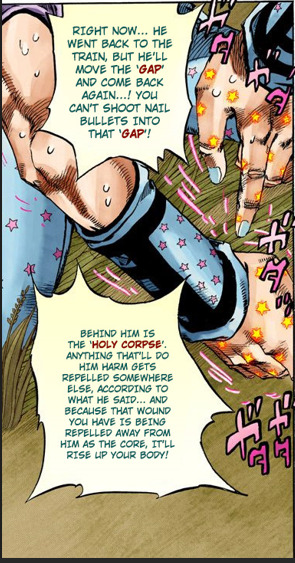
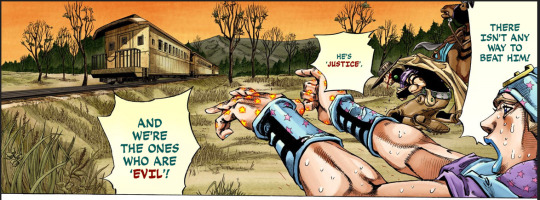
Chapter 79: D4C (Part 12)
Valentine and Johnny's stances on faith are opposed to one another throughout the final confrontation. Valentine is trying to impose his version of "righteousness" onto the world. Valentine believes that, through the corpse (religion), he has the right to decide who is worthy and who is not. Johnny, by contrast, is fighting to save Lucy and reclaim the corpse - to make himself someone 'worth something' again. Yet we see that even Johnny isn't completely sure of that his path is the 'righteous' one. Does someone like him (someone still unworthy, a sinner) even have the right to oppose Valentine's vision? Is he worthy of forgiveness?
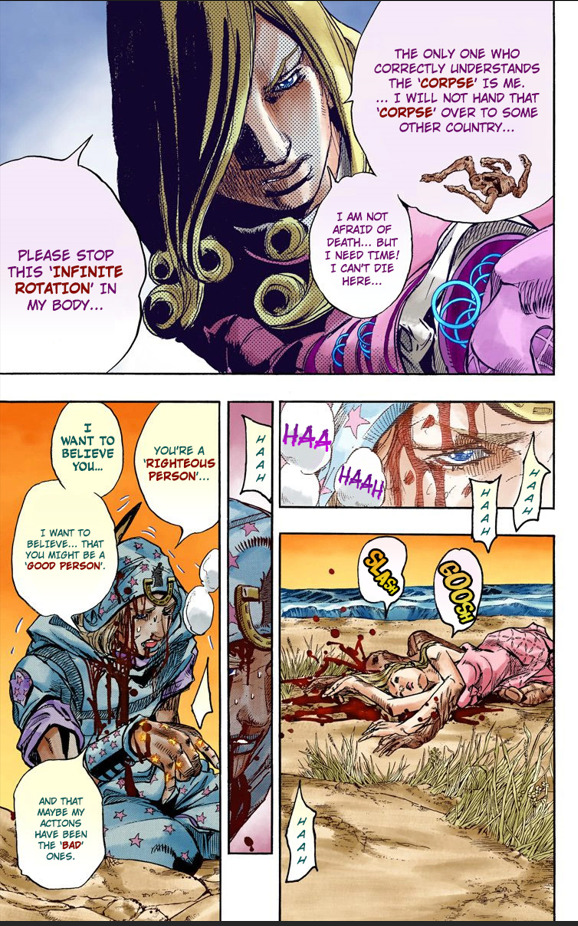
Chapter 88: Break My Heart, Break Your Heart (Part 1) - quick side note: notice how Johnny still has very low self-worth and continues to condemn himself as a 'sinner' (someone evil) frequently and without much cause. Even after Valentine literally killed his best friend, Johnny struggles to see himself as someone who even at the bare minimum deserves to judge others. George Joestar when I get you...
Valentine assumes a similar role to Pucci. In this final confrontation, he is representative of the use of religion as a tool of power.
Quick aside here:
The comparison of those involved in the race to a lamb - famously associated with Jesus Christ himself - is curious.

Chapter 85: Ball Breaker (Part 3)
Valentine indirectly refers to Johnny as his 'greatest challenge' and moreover attempts to force him to attack first (Chapter 85: Ball Breaker (Part 3)). Valentine is trying to force Johnny to become a sinner again before he condemns him to death for being unworthy of Valentine's 'righteous' world. Valentine is literally acting in God's place as judge, jury and executioner by determining who is 'worthy' and 'unworthy'.
Johnny, on the other hand, is representative of religion as a healing influence. He doesn't want to influence large groups of people or protect any nation. His connection to God and Christ through his faith is far more individualistic and personal. I think it's very telling that he's the winner here.
Section VI - Conclusion
At the end of SBR, we learn that despite everything - even through his crisis of faith - still, Johnny prays. He's always been praying.

Chapter 95: The World of Stars and Stripes
The story of Steel Ball Run is about finding your faith again. Johnny always prayed, even when he thought he’d never be forgiven, even when he believed God wasn’t listening. He is the kind of person that miracles are for (as alluded to by Gyro and Hot Pants in Section II). Johnny is the only religious character to escape the narrative unscathed, largely because religion was something so deeply personal to him. Rather than simply being 'selfish', his goal was personal, spiritual redemption. Faith carried him across the continent, helped him overcome his trauma, helped him connect with Gyro, and showed him how to find self-worth again after his lowest point. His faith was sincere and for himself, in contrast to most everyone else in the story who tried to impose their beliefs onto others.
Hot Pants, a member of organized religion, used it as a means to an end but never found the forgiveness they were looking for because their faith was performative. Pucci too failed because he used his faith (in the Heaven Plan) to try and assume control of the fate of others (similar to Valentine).
In contrast to Pucci and Valentine, Johnny absolutely wavered in his faith. Several times, in fact. He believed for most of his life that no one, least of all God, was listening. God had no plan for him, because his life was a mistake. Even so, he found comfort in praying for himself and Gyro, and by the end at last believed himself someone worth forgiving. And he was forgiven - cleansed, if you will. His being able to walk at the end of SBR is indicative that he no longer considers himself a sinner, but someone worthy of a new beginning as a person.
By the end of SBR, it’s apparent that the corpse itself isn’t what Johnny needed. It was because of his relationship with Gyro and the trials they faced together that he was able to gain a better understanding of himself, where he fucked up in the past, and learned how to be a better person. Lesson 5 is the key. "The detour was the shortest past." (Chapter 84: Ball Breaker (Part 2)) Johnny never fully possessed the corpse, preventing him from using it as a shortcut to redemption. It wasn't the corpse, but the corpse hunt itself that enabled Johnny to find forgiveness in himself and reconnect with his faith.
Narratively, Hot Pants, Valentine and Pucci were punished because they were not sincere in their proclaimed beliefs or otherwise abused religion in a position of power. Yet religion itself still isn't represented as a negative thing. Johnny's character carefully combines themes of individualism and religion to demonstrate the healing influence of personal faith.
Closing Notes
This essay was a much bigger undertaking than my previous analyses, primarily because I feel I am not the person to be writing it. I wasn't raised particularly religious (I barely know the cliff notes of Christianity), but at the very least I hope this is valuable jumping off point for others.
I apologize if I repeated myself too much. This was a very messy essay and I tried to clean it up a bit, but I'm sure I missed some things.
Based on some brief scanning of different Christian denominations and what occurs in SBR, I'd say Johnny was probably raised Lutheran. What do you guys think?
Also, shoutout to Johnny’s little devil horns.
Thank you for reading! Please feel free to share your thoughts as well.
#johnny joestar#steel ball run#sbr#sbr analysis#funny valentine#hot pants#jojo's bizarre adventure#jjba#jjba part 7#jojo's bizarre adventure part 7#wow this was a lot#i love u johnny joestar...#my posts#johnny joestar character analysis#hopefully my last sbr analysis... yippee!#ofc this is only one aspect of johnny's character but i feel it's one often overlooked#when it's almost critically important to understanding him#steel ball run analysis
21 notes
·
View notes
Text
watched the first 30 minutes of the new live action ATLA bc I was Curious and they have already committed three different mortal sins that I can't Not Rant about, spoilers for the first 30 minutes below the cut
1. They rearranged the order of storytelling to open with the Fire Nation attacking the Air Nomads.
And I'm not.... totally sure why? Like, my guess is either "we need to make an immediate dramatic hook for the people who have never seen ATLA before!" or "we need to explain the background for the people who have never seen ATLA before!" But the truth is, people never saw ATLA before it came out, and they were perfectly fine catching on to learning about what happened to the Air Nomads and the geopolitical state of the world in media res!! That is not an excuse!
By opening with The Attack On The Air Nomads, not only do they rob the audience of getting to do my favorite thing throughout, which is the ability to piece together backstory via being told details as the story goes on, but it also..... vastly undermines the impact that That Attack Happening is going to have later in the story. Instead of piecing together tragedy from 100-year-old ruins and getting the moment of "oh god" and imagining it, we're shown it directly upfront onscreen, which not only to me comes across as unnecessary and gratuitous violence, but it means that every time in the story that The Air Nomads Are All Dead is going to come up, instead of it being this weighty thing that we can only imagine that each small detail adds even more to that weight, the payoff was all upfront. We've seen it, there's nothing to imagine, any detail they give us is not adding to our understanding of the tragedy and increasing the tragedy to us at all, it's just a reference to the opening scene.
2. STATUS!!!!!
So 'Status' is a concept that I rant about a lot and am highly sensitive to in writing, probably bc in the gay theater camp day camps the first thing you need to teach your 8-year-olds in improv workshop is How To Respect Status if you want to have at all a reasonable adventure game; otherwise you have kids interrupting the king's big dramatic speech and hence Undermining The King's Authority and the adventure game falls apart but also so you don't get trapped in scenes where you've got two characters yelling back and forth "well I'm [this thing] so you should respect me!!" and the complete lack of respect between them totally undermines what both of them are saying and the fiction falls apart. I kind of joke but not really that I stopped watching Supernatural in like. season 8?? 9?? because there was some episode with Greek Gods and you got to the finale of the episode and Zeus was going "dO YOU KNOW WHO I AM??? I'M ZEUS. I'M A GOD. PUNY MORTAL" and Sam and Dean went "dO YOU KNOW WHO WE ARE??? WE'RE THE WINCHESTERS. WE TOOK DOWN SATAN AND ALSO SATAN'S MORE EVIL OLDER COUSIN. PUNY MONSTER OF THE WEEK" and I went "by day three of camp my nightmare 8-year-olds can do Status better than this. Why am I even watching this?"
In the first scene, the live-action ATLA severely undermines the status of the Fire Nation and Fire Lord and then continuous to do so throughout the entire opening.
The initial scene is some random Earth Kingdom spy running away with Fire Nation plans to attack the Earth Kingdom and getting captured and dragged before Fire Lord Sozin (to be?? monologued at by Fire Lord Sozin of 'HAH you fell into my TRAP, those plans were FAKE, we're attacking the AIR NOMADS' which is just. dumb. kill the spy, don't monologue at him and kill him, but also why the fuck are you letting an Earthbender spy into your presence in the first place???????) which besides the aforementioned letting?? an earthbender spy??? into his presence in the first place????? He:
is not wearing particularly fancier clothes than the other people around him; like, they're okay, but the 'total desaturation of all colors including/especially in the clothing' aesthetic that Netflix has going makes it not look very royal. that shit should have been BRIGHT red or 10x fancier to make up for the fact that it wasn't Bright Red
they are STANDING IN THE THRONE ROOM and INSTEAD OF BEING BEHIND THE CURTAIN OF FLAMES he's just STANDING DOWN THERE on the SAME LEVEL AS EVERYONE ELSE????? WHY ARE YOU EVEN IN THE THRONE ROOM IF THE FIRE LORD IS???? NOT ON THE THRONE?????? JUST STANDING AROUND???? THE FIRE LORD DOES NOT JUST STAND AROUND WHERE IS THE POMP AND CIRCUMSTANCE OF THE OFFICE????????????
and then beyond the absolute idiocy and letting a nobody no-name spy into his presence like that and dramatically revealing battle plans fucking idiot deserves to be assassinated for letting a spy earthbender get within three feet of him that's just extremely bad royal security, Sozin personally Murders this Random Spy. with his own firebending hands.
One of the whole things that makes ~the Fire Lord~ so terrifying is the sheer amount of weight around The Institution Of The Fire Lord, the courts and the backstabbing nobles of the fire nation, both the extreme imperial politics and complications there but also the almost deification of the office itself. The Fire Lord is untouchable, I forget if it's fanon or canon that they've got a 'descended directly from Agni / divine right' thing going but if it's fanon at least canon has those vibes, and one of the biggest aspects of the finale of the whole show is the combination of Azula's meltdown making it so that even though she was 'Fire Lady' she.... wasn't particularly scarier because in panicking and banishing everyone she'd totally undermined her own power structure, but also realizing that Ozai was Actually Just Some Dude Who Sure Was Pretty Good At Firebending And A Really Shit Person And Terrifying For What He'd Done With His Power but he wasn't a god, he wasn't impossible to defeat, when push came to shove he was just a firebender and as such his power could be stripped.
Fire Lord Sozin standing on the same level as his advisors and a random earthbender spy, and then doing things with his own hands, instead of, you know, sitting on that throne behind that wall of fire while this scene was happening if this scene really needed to happen in the first place, totally undermines that sort of deification level of status that the Fire Lord is supposed to have. Sozin becomes an Evil Scary Murderer Villain, sure, but what proceeds to be established about his character is. Nothing to set him apart from "a particularly skilled Firebender." Hell not even that, as nothing ever demonstrates that he's substantially more skilled than the firebending soldiers around him!!!!!!!
And it undermines the severity of the threat of the whole Fire Nation to undermine the status of the Fire Lord and hence the Thing That Makes The Next Fire Lord So Scary. hnnnnnnnnnng.
3. Every single character keeps giving extremely stilted monologues about how they're feeling?
It just feels like Bad Writing. And it also kind of feels like incorrect characterizatons? Big "he would NOT say that" mood but also just, like. Aang giving a three minute monologue purely to Appa about how he never asked for the responsibility of being the Avatar, he just wants to be like other kids, that just feels. So Cookie Cutter. So "gotta check off our refusing the call so our protagonist is Relatable!" and also just he would not say that.
This doesn't quite bother me as much as the other ones because it doesn't feel like a fundamental undermining of the narrative and/or the setting but it is Highly Annoying.
anyways defs not worth the watch. 30 minutes of my life Wasted. some of the costumes are kind of nice tho so might go back for the costume refs.
#live action atla#netflix avatar#just some random musings but it's been a While since I've dropped any sort of writing analysis#and I kind of miss doing it#do truly love how like. the Vast majority of my media criticisms#or at least the ones that I get Annoyed enough to Go On Rants about#are the ones that break the rules of Status#bUT HNNNNG STATUS IS SO IMPORTANT!!!!!! YOU LITERALLY CANNOT TAKE ANY CHARACTER SERIOUSLY UNLESS THE CHARACTERS#OR IN THIS THE FRAMING OF THE SCENES THEMSELVES#RESPECT THAT STATUS#HNNNNNNNNNNG
20 notes
·
View notes
Text
Ashton Greymoore: Chronic Pain, Physical Touch, and the Juxtaposition of Toughness and Vulnerability
(Spoilers up to episode 38 of campaign 3 of Critical Role)
I’ve been doing a lot of thinking about Ashton in the context of the recent confirmation in canon that they experience chronic pain, and I’ve just finally managed to put all (or at least, most) of my thoughts about it in the same place.
We got this exchange in the most recent episode of 4-Sided Dive, during a segment where Taliesin was talking about how Ashton is changing the way they think about his past and what it might mean, after saying that he’s starting to trust the group more:
(Four-Sided Dive episode 8: Why are you like this?!):
Tal: Just…like, to throw out–Ashton only, like, really touched another member of the group very recently. There hadn’t been a lot of close physical contact until like, the last game (Sam: Whoa). That was the first, like…yeah.
Sam: Is that a thing?
Tal (matter-of-factly): Uh, yeah!
Sam: Not a toucher?
Tal: Everything hurts.
Sam (incredulously, still trying to wrap his mind around it): Everything hurts?
Tal: Everything hurts.
Matt: Yeah.
Sam: Always?
Tal: Yeah. Uhh–
Matt: Chronic pain, man.
Tal: Beating the living fuck out of things helps you ignore it, and yeah, once this (gestures at head, indicates Ashton’s rage) starts going, it kind of lessens, but yeah. It’s just, everything’s always low-key bad. Not even that low-key. (Sam: Wow.) Yeah. It’s why they’re a dick. (laughs)…But yeah, there was an actual like, “oh god, okay, physical contact, this is happening. Alright. Okay.
The moment it seems like Taliesin is referring to where Ashton allowed physical contact was this sequence with Orym:
(Campaign 3 episode 38: A Dark Balance)
Marisha (as Laudna): We’re like a…a real family.
Liam (as Orym): Yeah. Yeah, I think so.
Tal (as Ashton): Could be.
Liam (as Orym): Get down here. (puts arm around Ashton’s shoulders and tugs them down towards the tree)
Tal (as Ashton): No, I–careful, I–yep, yep, okay, this is weird.
Liam: I start to give him a noogie, but it hurts.
Everyone else: (laughing and agreeing)
Tal (as Ashton): Yeah, this is weird. Ah, this is weird…okay. No, I’m okay. I’m okay. (continues mumbling in what seems like a forced-calm voice and looking unsure)
Ashton’s obvious uncertainty about this contact (especially when he said “careful”, which I missed on my first watch because there was cross-talk happening) rang so, so true as a “I don’t actually mind you touching me, but I am very nervous that you’re accidentally going to hurt me” thought process. This is a process I’m personally very familiar with as someone who experiences chronic pain (I had to tell a preschooler multiple times today that she needed to hold onto more of my hand than just my pinky while she was balancing on the bench or she might hurt me because I was genuinely quite worried that she was going to dislocate my finger if she fell, lmao).
Like a lot of things that Ashton does, it seemed to have registered with the other players and with the audience as an “I’m edgy, I don’t have friends, and I certainly don’t let people hug me” schtick. Which is, of course, the point.
Ashton swears and presents punk and pushes people away and is (as Tal said) just generally a dick to distract people from their chronic pain and his loneliness.
And it works! It’s extremely effective! Absolutely none of what I’m saying is intended as negative criticism of any of the people involved (because I think this is going to be resolved in-game, and I also wouldn’t be surprised if it’s a conversation happening behind the scenes as well, even though Sam still seems completely bewildered by the concept of chronic pain lmao), but the edgy charade works so well that even characters who are usually thoughtful and careful tend to overstep boundaries and assume that Ashton is always fine with their body being used as a resource and can take extra pain. And Ashton doesn’t give them any obvious reason not to keep doing so!
Some examples:
(Campaign 3 episode 24: The Hellcatch Valley)
Tal (rolls a nat 1 dex save, Ashton ends up with a harpoon bolt through his side and 24 points of piercing damage. As Ashton, sarcastically, after it takes everyone a minute to notice): I'm sorry. You were all busy. I didn't want to interrupt anything!
(Some scrambling to help, they end up pulling the harpoon out)
Sam: I’ll cast Cure Wounds…just a level one. You heal 10 points.
Tal (as Ashton): That is good. Ow! Ow. Well, it's been a great day. I'm going back to sleep. Goodbye. (laughter from the group, continues OOC and quietly, unacknowledged by the rest of the players) I don't make it to the bed. I just fall over.
(The party returns to their previous conversation)
And:
(Campaign 3 episode 28: The Deathwish Run)
Liam: Orym springs up and lands and sits on Ash's shoulder– (needing a higher vantage to keep an eye out over a crowd)
Tal (as Ashton): “Ah–” (startled, possible pain, but accepts it and helps steady Orym)
Liam: –but I want to look for anyone that we recognize.
This one in particular stands out to me because Orym very clearly does not ask if it’s okay to use them as a perch, or give Ashton much of a chance to respond. There’s too much going on at the time to Taliesin to respond, either, since Otohon Thull and Ratanish walk over to them immediately, but based on what Tal said in the most recent 4-Sided Dive, it’s very possible that Ashton would have rejected that contact given the moment to do so. Tal may have even dismissed it as something Ashton wouldn’t have let happen but there wasn’t a good time to retcon it, which is why he phrased the statement about the contact in episode 38 being the first time he’s allowed it.
Other examples that I didn’t want to search through transcripts for, in the category of “Ashton does a Thing even though he knows it will Hurt without telling anybody that it hurts, whether that’s because somebody asks/demands it of them or of their own volition”:
Ashton carrying the statue out of Jiana Hexum’s house for Fearne
Carrying Orym inside after he fell off the skyship
Carrying FCG up and down ladders in the Fownsee Hollow
Carrying Laudna’s body for miles
And then there’s every time Ashton is very vocally expressing that he’s in pain (they’re not subtle about it lmao) and doesn’t get checked in with afterwards. Some examples of this are:
During the carnivorous plant fight in the jungle
The aforementioned harpoon incident
Later that day when he rolls a nat 1 to swing the hammer and ends up dropping it in obvious pain (“Ow! OW. Ohh, yep, can’t do that. I–ahh, yep, gonna go pick that up.” in exactly the same tone and cadence that I hear from myself when I’ve just done something that I should have known was going to fuck up a joint, especially when I’ve got another injury compounding the baseline pain)
Sometimes they do get checked in with, at least briefly, but usually not past the initial “cast a healing spell and move on because there’s too much happening to really take the time to make sure they’re okay” stage:
The Ratanish fight at the ball when Dorian secretly casts Cure Wounds
The time Ashton gets Phantasmal Killer cast on them during the fight where they meet Dusk/Yu and Orym takes his hand to lead them back over to the group, and Fearne casts a Cure Wounds afterwards
Still, as Taliesin said, Ashton only very recently started feeling more comfortable being vulnerable with the party. It’s why they asked Imogen and FCG to check their memories, why he allowed himself the “Ashton, are you going soft on us?” “No! Yes. Fuck. I need a drink.” confession after the “You make me happy” speech, why they didn’t pull away when Orym put an arm around him. Previous attempts to ask them about their pain probably wouldn’t have resulted in them opening up. But now? They’re changing.
We really are seeing an Ashton who’s going soft. Again. “I was soft, once”, and he’s returning to that state: not physically reverting back to a non-genasi body, of course, but just letting down the emotional rock walls that have been protecting an affectionate, caring, genuine interior, of a person who desperately wants to be vulnerable, and just needs a little convincing (as he admits to Fearne, “I'm having this moment where I'm realizing that perhaps one of the reasons why I allow myself to get the shit kicked out of me is in the hope that people are actually fucking watching.”). He needs these people to prove that they’re not about to leave him, not about to realize his weaknesses (even though he wears most of them on their skin like a signpost–if they just keep acting tough, if there’s no cracks in his facade like there are in his body, then nobody will notice) and abandon him like their last family did, before they’ll let themself be truly vulnerable.
And it’s why, I hope, something will shift in the way that Ashton and the party respond to his pain. I would love an acknowledgement that chronic pain brings limitations, that they let the disabled character be disabled (preferably mechanically, because I know they can incorporate that kind of mechanic–they’ve done it before with mental illness, with Caleb, with Imogen, with FCG, and it would mean so much to me if the same sort of consideration could go into a physically disabled character’s mechanics. But I would accept pure story/flavor acknowledgement as well).
I also hope there’s going to be an in-game conversation about how Ashton feels about being touched, letting him set boundaries and tell the party specifically what hurts too much, when to ask permission, when not to touch at all, and when and where it would be welcome.
It’s obviously something Taliesin is thinking about, and I think it deserves to be discussed in-character. This period of time where they’re stuck on a skyship with nothing plot-urgent happening seems like a perfect time to have those conversations…(holding out hope for that next episode lol).
This all ties in with my last post about the topic (it doesn’t have to hurt more to be love!), and it’s something I obviously feel very passionately about lmao. I want to see a disabled person with chronic pain that does limit them, that inconveniences their friends sometimes, and I want to see them get loved and cared for and accommodated because their pain is a part of them, and it’s not something that can or should be ignored.
In other words, as Matt said, “To clarify, there is strength, and there is pain. There is pain, and there is strength.” Pain and strength, strength and pain, equally present, equally important to his life and to their character. We’ve seen so much of Ashton’s strength. It’s time to let them show their pain.
#ashton greymoore#critical role#critical role meta#bell's hells#critical role campaign 3#yeah i'm main-tagging this#everyone should read my essay i worked hard on it#edit: i added the 'get hit to see if people are watching' quote#bc i woke up this morning reread the essay and very strongly regretted forgetting it the first time#bc it's SO important to the way i view ashton's character#incomplete analysis without it
301 notes
·
View notes
Text
I would kill. KILL to have a conversation between Veth and Deanna. About being forced out of your life by tragic circumstance. About being brought back in a way you never thought you would be, about being brought back in a way that forces you to build a new life. About building these complex and intense relationships with people totally outside the bounds of traditional familial relationships. About adventuring and doing big things when you never thought you would have that type of life. About becoming comfortable in your own skin. About being mothers, about being removed from your child’s life; thinking you could never go back to them, and then being brought back in a way where you could go back to them, but something has fundamentally changed and it isn’t the same relationship. About how Veth has gotten her old life back to some extent, about how Deanna hasn’t. About how having a new body in the same time compares to having the same body in a new time. About what I’m wrong about in this post. About them both being monsterfuckers. About… literally everything.
#they’re both such cool characters#I wanna bite into them in an analysis way#also. about both of them being milfs#important to note that one#critical role#veth brenatto#deanna leimert
137 notes
·
View notes
Text
btw this might be me swinging a bat at a hornets nest but like. absolutely none of my disappointment from the tl finale comes from ship baiting or any relationships that didn’t happen (though to be clear, i think the tedbecca fake outs were meanspirited and served no narrative purpose - in noted contrast to the season's earlier jamiekeeley fakeouts, for example, which were explicitly there to demonstrate jamie's growth + maturity)
tedpendant is a really fun concept for me, and i LOVE the characterisation + thematic potential there!
but as someone who personally resonated with a lot of ted’s struggles, the idea that ted could leave richmond so… seamlessly, for lack of a better word, really doesn’t sit right with me. the thesis of the shows entire first season - assuming it can be said to have only one - was about how everyone needs the love and support of a community, whether that comes in the flavour of someone who hypes u tf up or someone who will relentlessly call u on ur shit (or, as happened quite frequently, both!).
rebecca, roy, jamie are the clearest examples as the characters with the most screentime: they were all deeply isolated and disconnected from the people around them, and that was making them miserable. the connections they made with the team, the vulnerability they finally allowed themselves to express (the ghost banishing ceremony comes to mind!), and them going on to want *more* out of their life are what made their arcs about *progression* rather than *regression*. without that clear theme of compassion + community inspiring positive growth in everyone who encounters it, there is, frankly, no season one.
my personal favourite scene from season one comes right after michelle walks away from ted, when they’ve agreed to get divorced. ted sits down on the bench looking gutted, and a little shell shocked - and beard sits down with him. hands him the drink, and they sit there together. silent, but together. to me, that scene is an implicit promise from the episode, to the audience: ‘it’ll be okay. it’s going to be hard, but ted isn’t alone, and his friends won’t leave him behind.’
it also makes it clear to the audience that ted isn’t the saintly-giver-of-grace who needs nothing in return, as one might assume on first brush, but rather that he’s Also struggling with his own shit (as is everyone, always, in real life!) and he has something he needs from the people around him too.
and looking at the text of s3, and the conclusion to his arc in the finale, i just don’t believe that he got it. he wasn’t just sad that he was leaving (which would be understandable!), he was completely closed off. unresponsive to the people around him reaching out, borderline confused as to why they were trying so hard!
(side note, while i completely respect the read of ted and trents last interaction being rather rude + ooc on ted’s part, i personally read a different motive into it. for me, it was more like… he didn’t understand where trents enthusiasm was coming from? like, he read that as trent being too invested in what other people think of him, and responded in a way that he hoped would emphasise that ted doesn’t *need* to laugh at everything trent wrote, bc trent Already Knows that he’s done something really cool and kickass, and he shouldn’t value anyone else’s reactions above that. basically, based on his demeanour in the episode, i genuinely don’t think it would’ve even occurred to him that trent was more invested in HIS reaction than he would’ve been with anyone else.)
again, looking purely at the text, the show had already established that ted has really strong depressive + avoidant tendencies, as well as panic attacks (largely triggered by his fear of not being ‘good enough’ in various roles, ie: a father). we saw one area he was able to calm HIMSELF abt these fears (worry for henry, which is a Hell of a choice considering the ending…), but in literally every other heightened moment, he had to rely on his support system to help him make the choices that he WANTED to make, rather than ones inspired by avoidance and fear (ie: confronting michelle abt jake, talking to his mum abt why she was visiting + his dads death).
and to be clear, this is a GOOD THING! we’re not supposed to go through life alone, no matter how bad OR well we’re doing. rebecca and keeleys friendship isn’t worth less for all the scenes where they’re both in good places. if anything, the opposite is true - it’s lovely that they both have someone who want to celebrate the achievements in their life!
and fuck it, we’re sure as hell not supposed to go through life with exactly one (1) person whom we expect to fulfill ALL of our emotional needs at all times either! like, im sure i don’t need to labour my point here, but tying everything to one (1) person in ur life doesn’t make u any less isolated than if u were going it completely alone, whether it’s a family member, a friend, or a partner. i won’t pretend to know the first thing abt what it’s like to be a parent, but i don’t think it’s unreasonable to say that no parent would be at their best if they had absolutely no support/camaraderie/general love provided to them from Anyone other than their child.
so when ted is SPECIFICALLY shown to be in a bad place, over and over again (did he come to terms w his fear to be close to henry overnight???????), and then removed from his community? of COURSE the audience is left feeling unsettled, and like the rug has been pulled out from under them. there was no time in this finale dedicated to how ted would still be in contact with anyone from richmond. no promises of visits, or phone calls - fuck, nothing about emails!! according to the text, we might as well assume this is a clean break (and the maybe-dream-sequence does Fuck All to assure us otherwise. if ted doesn’t go to beards wedding, what WOULD he go to????). and since the show has ALSO completely failed to give us even an IMPLICATION of who/what ted’s support system would be in kansas, there’s… a reasonable argument to be made that this is It for ted. that, after two seasons doing NOTHING but attesting otherwise, the audience is supposed to suddenly believe that ted can (and SHOULD!) pull himself up by his bootstraps, and cope entirely on his own.
that, to me, is a betrayal of the show’s premise. we were promised a show about how, no matter how dark things may get, none of the characters would be left to struggle alone. and then they ended the show with ted alone.
i don’t know. i guess if i had to give this post a tldr; if anyone has any gen fic/meta/Literally Anything in the pipeline, i would absolutely love to be tagged/directed towards it. i’ll be endeavouring to write something myself, as well, but it might take a while before i can return to my WIP, lol.
#this is the most measured version of this post i was capable of fghjskdjhgfdgjhsfd#the least measured one is just the aromantic flag with the ‘we are going to beat u to death’ meme overlaid#look ik this is hardly impartial wrt very small + insular communities like nuclear families#but its fucking impossible to go into media analysis and not bring Anything from ur real life in there w u#so im trying to forgive myself for being a little hashtag Vulnerable + Opinionated on main#in the spirit of what this show could’ve been lol#if not here then where etc etc#Ted lasso spoilers#Ted lasso meta#Ted lasso critical#also just to be clear here im being dead serious abt that last point#im spiritually doing the jamie run to demonstrate to u all how badly i want gen shit#please. p l e a s e .#okay wait last ramble here but. this is also why the lack of information we got on trent was so crushing to me#like ur telling me this man went through the incredibly painful + harrowing process of breaking out of his (comfortable! safe) shell +#cynical journalist persona. came out to someone VERY important in his life. and has done nothing but face the music wrt acknowleding#his past mistakes + endeavouring to be better and kinder. and we never get to know if he has ANY support through all that? at all?#is he dating? what's his family situation like? does he have full custody? any friends from work? any friends period?????#like i can should must and will die on the beard + roy + higgins + colins are trents best friends hill but#its like the premise of the show stopped mattering just in time for him to be left in a legitimately depressing limbo#like 'yes everyone needs love + support bc life is rlly hard. but we're tired of making a show abt that so This Is All Ur Getting#+ screw anyone's personal life that u didn't already see in s1. You Know Enough.'#anyway i love u all this is a very silly show and im gonna go play t.o.t.k for a few hours o/ <3
80 notes
·
View notes
Text
So this is what, the 3rd time Porter has been decked by a character because of his attitude? At minimum?
Under the cut for long and rambling character and literary analysis
We have the initial fight 4-5 years ago between Porter and Vincent
We have Lovely getting him during their "Switzerland" talk before the Summit
Now we have Asher at the Summit (part II electric boogaloo)
At this point, I'm starting to wonder if we're even supposed to like him as a character. Sure, he's charismatic. Porter got Treasure wrapped around his finger in less than an hour. But Mr. Redacted is usually pretty clear about delineating between who is intended to be the characters we're supposed to be supporting (with enough moral grayness to make them complex and interesting). So many of his characters are a great example of the difference between the narrative 'protagonist' and the narrative 'hero'. Going back to the more technical literary term, a protagonist* is the character the story is about, but they're not necessarily the same as the hero of the story. Yandere!Ivan was a great protagonist, but he's very obviously the villain of that plotline. If you want a classic example, Michael Corleone (The Godfather) is a villain protagonist.
*I'll point out that depending on what exact definition you're using for "protagonist" that you can argue that the listener character is supposed to be the main character. I don't think that fits because in many of Redacted's cases the listener falls into the "sexy lamp" trope, where by design they have few if any character traits of their own so we as listeners can project on them. To me, they're the point of view character, which though usually is not always the same as the protagonist. IMO, a protagonist should play a more active role in the story. Overall it's a fascinating way of capitalizing on the limitations of Mr. Redacted's chosen medium, and I'd love to hear other people's thoughts on this phenomenon.
Most characters fall into either the 'hero' or 'villain' category. Characters like David, Asher, Vincent, Elliott, Guy, Ollie, and Gavin are all clearly hero protagonists**. Their respective stories revolve around their interactions with the listener character, they're the good, upstanding citizens that we want to support. They've got flaws, sure, but for the most part they're meant to be appealing characters that we agree with. Characters like Marcus, Yandere!Ivan, and Regulus are clearly the villain protagonists; they're the "bad guys", we want them to fail in whatever terrible thing they're trying to do. (Which isn't to say you can't enjoy their particular brand of twisted. Dark characters and themes are important and have their place).
**with the caveat that different focal length of a particular story can change who is the technical 'protagonist' and 'antagonist'. Kody, in his Water Elemental videos, is a 'villain protagonist'; when you look at the DAMN series overall he's better classified an antagonist of season 1. The fact that there's so many perspective changes across Mr. Redacted's overall work means that a lot of these terms can get muddied depending on which specific set of videos you're referring to.
Which brings me to the 3rd type of protagonist, the anti-hero. The anti-hero is a protagonist that the reader/listener wants to succeed, but generally lacks the traditional/universal moral traits that usually define the classic hero protagonist. Examples of an anti-hero protagonist include: Deadpool, Walter White (Breaking Bad), Huckleberry Finn. In particular, the mark of a well-written antihero protagonist is the fact that it can be difficult to distinguish them from a villain protagonist. Vega is a good example of this; in the Sadism's Hold/DAMN S1 series he's an antagonist for Freelancer and Yandere!Ivan. He graduates to a villain protagonist in early Carpe Deus, and with his stated goal of preventing another Cacophony he's morphing into an anti-hero in the more recent videos. I'm sure you can get hyper-specific if you start going through all the TVTropes pages to find the perfect flavor for individual characters, but most major protagonists can be classified as one of those three groups (with eternal, ongoing debates on where specifically you draw those particular lines based on your particular morals).
Bringing it back to Porter, I'm not sure that he's meant to be an anti-hero. He's charming, intelligent, capable, and likeable (to those not biased by his history like Vincent and Sam). But I don't think we're supposed to support him as a character overall. We've had too many "hero" characters come to conflict with him; Vincent, Asher, and Lovely explicitly. Even without getting into the fine distinctions between a protagonist/supporting character/POV character that's an awful lot of animosity from some very well established people. We might not know all of his goals/motives yet because they haven't been revealed to us (Porter wants to support William, wants to gain 'power', but why? What history drives him? What is his specific end goal with that power?) but his manipulation of other people, ruthlessness, and his own acknowledged boot-licking to increase his own social power disqualify him from a traditional "hero protagonist" role. An anti-hero is one we still are intended by the author to want to support, a character we want to see succeed. But because Mr. Redacted keeps putting Porter into direct conflict with more traditional protagonists it sets him up to be an opposing force; by definition he is an antagonist to our established hero protagonists.
I've talked a lot about the different types of protagonists and some of the minute distinctions between the different types of protagonists. Antagonists can be even more variable; you have your classic Devil, Sauron, and Darth Vader trying to kill your protagonist heroes. Technically speaking, antagonists don't necessarily have to be characters, either, they can be forces or concepts. An antagonist is just someone or something that opposes the protagonist. I won't divert into the different types of conflict in a story, but I'll point out how much more variety there is for your villains than your heroes based on their particular blend of moral alignment and narrative framing. (It's a lot easier to make things go wrong than it is to make things go well). You can also have sympathetic antagonists, where the villain has acceptable motives even if their methods are objectionable and cement their status as villains. Think the Wicked Witch of the West; Dorothy killed her sister, revenge is an entirely reasonable motive even if we're not supposed to be on her side. Adam and Quinn are the clearest unsympathetic antagonist villain characters in Redacted-verse. Blake is a sympathetic antagonist, vacillating between a villain and an anti-hero depending on whether we're looking at him from Sunshine or Bestie's POV.
As far as my initial claim that we're not supposed to like Porter, we have to consider which lens we're looking at him through. From Vincent's perspective he's an unredeemable asshole. William, however, clearly sees something in him. Other characters we trust that don't have that skewed perspective because of baggage, like Asher, don't like him either. While Porter is the protagonist of his own videos (you are the main character inside your own head) he's not being cast as a classical hero. Morality wise, even in his own story he's an anti-hero at best (he wasn't honestly trying to warn Treasure off, he was luring them in to SkySide). He's got the potential to be sympathetic (at least, according to Sam and William) but he's outnumbered in the narrative of protagonists (at the very least, by Vincent, Lovely, Asher, and there's evidence for Milo and David because of what he put Sweetheart up to) who consider him an antagonist, causing them problems or otherwise being obstructive. Considering the weight of numbers and length of existence in the overall story Mr Redacted is telling, Porter so far is generally being portrayed as an antagonist to our hero protagonists but not necessarily as a villain (like Vincent wants him to be) of Close Knit's caliber. So, this leaves him in a very interesting position on the morality/perspective spectrum. Essentially:
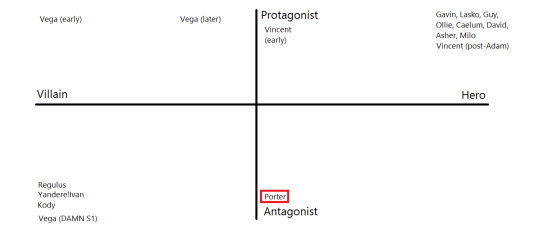
[Photo ID: a graph running from Villain to Hero along the horizontal axis and Protagonist to Antagonist along the vertical axis. Gavin, Lasko, Guy, Ollie, Caelum, David, Asher, Milo, Vincent (post-Adam) are in the Hero-Protagonist Corner. Regulus, Yandere!Ivan, Kody, Vega (DAMN S1) are in the Villain-Antagonist Corner. Vega (early) is in the Villain Protagonist Corner. Vincent (early) and Vega (later) are in the Protagonist Antihero area. Porter is in the Antagonist Antihero area. /end ID]
Because of these mostly negative relationships to our established characters I don't think he's meant to be "supportable". There's too many reasons someone could write him off as unredeemable, based off of his history, his current actions, and his morals. Mr Redacted obviously intended us to be pitted against certain characters like Adam, Kody, and Yandere!Ivan in the same way the author intends us to like and support wholesome characters like David, Huxley, and Guy. I think Porter was written in such a way that we're supposed to disapprove of him despite his likeability in the same way we're "supposed to" disapprove of most of the Imperium characters or Alexis. There's a glimmer of "redemption" deep down for how good they could be if the universe was a little kinder towards them and they didn't have to resort to morally questionable (at best) actions and perspectives, but harsh circumstances left them protecting themselves with sharp edges designed to make anyone who gets too close bleed. Character complexity is attractive, but that's not the same thing as being sympathetic.
After all of this I have to say, death of the author is 100% valid as a concept. At least half of a story is determined by the reader themselves, and this in particular is just my interpretation of these particular facts and classifications. Depending on how you want to weight certain factors and perspectives you can come to a completely different conclusion. By trying to define a particular character the act of applying a definition means you have to be reductive; making a decision on which box to put them in flattens out their complexities. You don't have to APPROVE of a character to LIKE them. There's also a difference between a morally GOOD character and a COMPELLING character. Not every character has to be redeemed, it's not a prerequisite for finding them interesting. Just because Mr Redacted wants us to hate certain characters doesn't mean everyone is obligated to; you're entitled to your own opinion.
#redacted asmr#redacted porter#character analysis#character criticism#to be safe#I'm trying to keep an open mind#I don't like him#but I find him fascinating#i want to put him under a microscope and study him#nuance is important#idk if anything I've said here about authorial intentions is contradicted by the podcast but#word of god is NOT the same thing as canon#i was thinking my thoughts and came up with this
27 notes
·
View notes
Text
"my interpretation is more meaningful than yours" this "___ piece of media is objectively bad" that. yeah, well have you considered I'm having fun? 🤨 have you considered that I strive to be joyful rather than striving to prove the worth of my opinions? 🙄
#analysis of meaning is great but dont let art elitism/perfectionism convince you you need to have the ultimate and perfect#reading or interpretation#or that the joy and entertainment you derive from a piece of media is directly correlated with how intellectual you can be about it#sometimes the goal is just entertainment#and thats okay#this is not to discourage media literacy or criticism of any kind#but it is to discourage people making others feel bad for not being#'smart enough to understand the TRUE interpretation of xyz'#like some of you are starting to sound like rick and morty 'you need a high IQ for this show' dudebros#esp when you say shit like 'cant ppl do better analysis then a 3rd grader' for shit that literally comes down to personal opinion#like ik some ppl miss the entire point of a piece very often and i find that frustrating too#but lets be real some of yall just attack other peoples interpretations cause they contradict your own#and not cause theyre actually problematic or misinterpretations#'a nihilist reading of this character is much more meaningful than an autistic reading' what if i killed you#both is good. jesus i thought yall liked bisexuals.#I AM SLAPPING A COEXIST STICKER ON YOUR FOREHEAD but instead of religious symbols its fandom#multiple readings can exist at once please ppl for gods sake#fandom#long notes#important
72 notes
·
View notes
Text
i am officially, FINALLY all caught up again in both the manga and the anime for bsd and OH BOY there are thoughts and opinions but also WHO CARES because my tags are finally FREE to be unfiltered
#hnnnnnn#i am SO happy#i am BEYOND happy#i love the arc even if i complain about it a lot#but i am also hnnnnnn…….displeased……..with a few things#the anime fr about to catch these hands#i already KNEW they were rushing it from the few episodes i had watched#but the anime is usually SO good at pacing#that i fully trusted that certain things would be slowed down for significance/impact/etc#but instead the pacing just stayed WAY too fast for me#and they ended up cutting SO many small moments that had SO much importance like im going crazy about some of them#some of the lines they cut…….#or even adjusted slightly that it drew away the impact#ugh i KNOW there was a LOT to balance and a LOT of content to get through#but i am a little disappointed that so many emotional scenes were what ended up suffering for it#this is why i don’t usually like reading the manga for animes i watch#i always end up getting disappointed by the limitations of adaptations#that being said though regardless of general limitations i don’t think some of the rushing is above criticism#and i am going to go and eat glass while seething over the particularly offensive rushing/cuts😤#OKAY DONE that’s the last i’ll say about it i would just go crazy if i didn’t vocalize it somewhere#in general i was VERY happy with the arc in both the manga and the anime i have SO much love for it#definitely a favorite for me#and THAT concludes my very vague no spoiler review#i swear one of these days my self control is going to snap#and im just going to start posting my full essays and content analysis shit about everything i watch here#but for now we’re safe and all my rants will stay spoiler free tag paragraphs instead godbless🙏
8 notes
·
View notes
Text
people who see themes in a text that are intended to be unsavoury and respond by going "how dare there be unsavoury themes in this text, does the writer know?"
people who see bad guys having bad opinions and respond by going "the text is sanctioning the opinions of the bad guys by presenting them to begin with"
people who see "good" guys having "bad" opinions and respond by going "this text is sanctioning the opinions of bad guys by presenting people who aren't perfect"
people who see characters having complex and uncomfortable journeys in which they're not always the uncomplicated good guy/handling their situations in unpalatable ways and go "but if the character we're meant to be rooting for isn't purely good, then that character must be bad, and if a character is bad then this text is bad for depicting them in the first place"
people who see interesting, charismatic, enjoyable to engage with bad guys and respond by going "this means that the writer/audience approves of [x] bad behaviour in real life"
people who see bad guys occasionally or often showing behaviours that they might agree with and respond by going "this means that they're being redeemed for their badness or their badness is approved of by the narrative, because no bad person ever does things I would ever agree with"
people who see bad guys having self-awareness about their actions and possibly even redemption arcs and respond by going "but no bad person can ever be less bad, all bad people are uncomplicatedly, un-changeably bad and must be punished, and any text that says otherwise is sanctioning badness"
people who see intentionally foreshadowed narrative moments in complex (and often not even that complex) narratives coming and respond by going "i can't believe that the writer is working intentionally with the audience to set up this moment, it must be bad writing, because they've been depicting bad behaviours and therefore the story/characters doesn't/don't deserve catharsis"
people who get to a point or the end of a complex (and often not even that complex) narrative that has depicted unsavoury themes that ties up the exact threads that it was following, and respond by going "this was clearly an accident, considering the unsavoury themes that made me uncomfortable, there was no way the writer was doing this on purpose"
people who engage with a story where things aren't all neatly wrapped in a bow, and not all emotional threads can ever be fully explored, because it's emulating the limitations people have in real life and respond by going "but if everything isn't perfectly wrapped up then that means that the writer endorses bad things happening, and should be punished/sanctioned in real life"
people who engage with tragedies and respond by going "i can't believe this was tragic"
people who engage with gothic romances and respond by going "I can't believe people did bad things"
people who engage with horror and respond by going "I can't believe this was gruesome"
people who engage with dramas and respond by going "I can't believe people couldn't communicate adequately"
people who engage with a story that includes conflict and respond by going "I didn't like that this story had conflict"
people who read stories and go "I didn't like that there was an arc"
people who engage with stories as if they're the enemy and any well-constructed element is an accident and not the craft of storytelling, rather than attempting to engage with what the texts are trying to do -- whether or not they manage it is something one can discuss afterwards, but people who fall down at the first hurdle by not even asking "what is the text about and why is it about this" and then perhaps the next question which is "what is the format of this narrative and why is it being told this way"
I think literacy and analysis ought to be a recurring class throughout adulthood, considering some of the things I've seen. sometimes it feels as if people don't like stories at all
#media literacy#analysis#literacy#narrative#fiction#tropes#critical thinking#media criticism#media critique#people really do jump straight to *and how does it make me feel* bypassing all the relevant points#how it makes you feel is only important in the subjective sense of whether you'd want to go back to the story personally#it's not really critique outside of actually asking what the text is doing and asking how it Wants you to feel#we can then argue if it's successful in that goal but also tbh. the least interesting question a lot of the time#because how you feel may not be how someone else feels#(this with caveats and disclaimers -- i am tired)
12 notes
·
View notes
Text
People defending the whole child marriage thing in Steel Ball Run love to bring up 'historical context' as an excuse, saying that Araki absolutely had to have Lucy as a child bride to a grown man because this sort of thing happened during this era.
Firstly, when has JJBA ever been that concerned with historical accuracy? But more importantly, this argument completely falls flat because this isn't an accurate depiction of child marriage. We get this complicated explanation that Steven and Lucy had to get married because of threats from a gang and that they have a 100% non-physical/sexual/romantic relationship and it is more akin to a father-daughter dynamic. And while I at least appreciate that fact, this renders the 'historical context' point moot because this is not how child marriages are.
Real child marriages from this era (or any era - even today!!!!!) were not wholesome or platonic, the little girls married off to grown men were not protected or cared for. A man would never marry a little girl purely out of the goodness of his heart and never hurt or abuse her. The risk would never not be there. Men were not marrying girls for wholesome reasons, these little girls were victims of rape and violence and had no power at all. They were abused, they had their freedom taken from them, they were forced to birth children and many died young in horrific circumstances. This was all inflicted on them by their 'husbands' - their captors, their abusers, their rapists.
So, by the logic of 'historical accuracy', what do we make of this? When Araki shows us an adult-child marriage but then insists it's OK and safe, are we then to assume this also reflects real history? Why is he depicting this real world issue if he's then going to show such an impossible exception? Or does the argument of 'historical context' only go so far? If it's fair to say that this aspect was changed in spite of historical accuracy, then why couldn't the marriage itself be changed? What message is Araki imparting about child marriages when his example is so exceptional, so wholesome and is just unfairly misjudged by outsiders and the audience alike? What is the deep and vital message he imparts on us about this real life issue - an exploitative practice which continues to affect 650 million or around 20% of all girls and women on Earth to this day? Tell me.
#that last statistic is from UNICEF and Girls Not Brides#mine#jjba#jojos bizarre adventure#important#text#analysis#critical#jjba critical#steel ball run#lucy steel#steven steel#tw child abuse#tw rape#tw abuse#tw csa#tw misogyny#tw child marriage
6 notes
·
View notes
Text
One thing about me is that I do not tolerate Wen Ning erasure in the slightest. Like I would throw hands for him (and have).
#wen ning#mdzs#mo dao zu shi#gdc#grand master of demonic cultivation#he's the jackal to wwx's tiger!!#and the only one who stood by wwx ever since they met (jc and lwj could never)#he and wwx have defied life death fate the cultivation world their clans everything for each other#also also wn and jc are foils and equally important to the plot (and to wei w- *gunshots*)#also also also fucking sick and tired of people thinking that wn's is just this nice shy guy/fierce corpse lacking complexity#or is less complex than most of the other characters#because if you take a minute to actually analyze his character you'd find that he's juat as comolex and multi-faceted as everyone else#you all just lack critical thinking and analysis skills
13 notes
·
View notes
Note
as someone who's personally never been a big dad for one fan, why don't you like it? 👀
obligatory disclaimer that ppl can headcanon/theorise whatever they want, im fully aware that AUs are just ppl having fun and dont necessarily reflect what they want to/think will happen in canon, etc etc
okay so, to me dad for one is fundamentally antithetical to who midoriya is as a character and his position within the narrative. midoriya is not a chosen one. yes he was literally chosen by all might to inheret ofa, but midoriya is different from a lot if shounen protagonists in that there was nothing inherently special about him other than his heroic spirit. he doesnt have a demon inside him like naruto, or saiyan abilities like goku, or even a hyper genuius intellect like senkuu. midoriya is literally Just Some Guy who happened to get noticed by all might. which is actually what makes his story all that more powerful. yes, midoriya being quirkless ends up working to his advantage with ofa and the whole 'last holder' thing does kinda feel like destiny but ultimately, all might chosing midoriya wasnt predetermined. there wasn't some grand prophecy or legend, there was no fates whispering in all might's ear, its just that in that moment with the sludge villain, all might saw midoriya be a hero and knew that he was the right person to inheret ofa.
objectively i get the appeal of 'ofa, a quirk born out of defiance to afo, is passed onto his hero son who takes him down' as like this cool narrative parallel but to me it undermines the whole basis of midoriya's character. he didnt get involved with ofa and afo and all might because of some hidden deeper connection between them all linking their destinies or whatever. midoriya is involed with everything that hes involved in because regardless of the circumstances of his birth, regardless of whether or not he got a quirk or met all might or got into UA, he was always going to be a hero no matter what.
with shigaraki, the whole sereniputous narrative thing of 'the grandson of one of the ofa users is groomed by afo to be the 'next him' and is the super villian nemisis of the current ofa user' works because shigaraki's defining character trait, his core theme, his 'origin' if you will, of hatered, is literally a product of the relationship between ofa and afo. shigaraki would literally not be the character that he is without his life, before it even began, being shaped by ofa and afo. but midoriya's origin is completely seperate from that, his origin is that of being a hero, no matter what, before he even knows a single thing about ofa and afo, before his life is shaped by them in any meaningful way.
i think there are two moments in bnha that make it blatantly obvious to me that dad for one was never going to happen.
first is back during the sports festival when, after hearing todoroki's backstory, midoriya kinda breaks the 4th wall a bit and thinks 'if we were in a comic book, he'd be the main character'. and the thing is? thats totally true!! yes 'kid with no powers in a world where everyone has powers' is a quintessential shounen manga story set up, but its not a super-hero story set up, as far as western hero comics (which horikoshi obviously takes massive inspiration from) go, todoroki with his tragic backstory and special dual-power would be the main character, which is what makes it all the more poignant that midoriya is instead. yes he inherets this great legendary power from the greatest hero ever and gets embroiled in this centuries long battle between good and evil, but prior to that, theres nothing about midoriya, other than his overwhelming heroism that made all might choose him, which is a choice wholly made by all might rather than some predetermined destiny thing, that makes him a main character.
the second is during the paranormal liberation war when afo tries to steal ofa and critises all might and the other vestiges for allowing the quirk to fall into the 'wrong hands' by ending up with midoriya, who he deems as weak, only for yoichi to defend all might's choice in selecting him as successor and his + the other vestiges' choice to remain within him. that has nothing to do with midoriya being some perfect, narratively appropriate, parallel inspired chosen one, hell its even before the 'you'll probably be the last user because your quirklessness makes you perfect for ofa in a way that quirked people arent' reveal. yoichi and the other vestiges' support and defence of midoriya, just like all might's chosing of him to be his successor, comes from nothing other than the understanding that midoriya is a true hero through and through.
'but leo! doesnt the fact that midoriya is a true hero mean it would be even more poignant if he were the son of the greatest villain ever' i hear you all cry, and the answer is no.
because if midoriya is all for one's son then it makes too much sense that he inhereted ofa. he goes from being this true hero who embodies the will of everything ofa and its users stand for, who is ready to carry on their legacy and offer the world hope in a time of despair, to being the ~perfect~ narrative choice to inheret ofa to fulfil a circle of fate and break a generational curse.
in the canon universe, if all for one is midoriya's dad, midoriya goes from being this character who's sheer conviction to win and save, to be a hero, despite his non-suited circumstances, and nothing else about him, makes all might, who had already planned to go to UA and select a student to be his successor, pick him, out of all possible people, to inheret ofa, to suddenly being the only possible successor. if dfo is true then it doesnt matter that in another life mirio or bakugou or someone else couldve been the 9th user, because by being all for one's son midoriya is put in such a narratively perfect position to inheret ofa that its obvious it was literally never going to be anyone else. which to me, wholly and completely undermines all the poignancy and narrative weight in midoriya, who had absolutely nothing to do with ofa and afo but who was such a genuine hero that all might and the ofa vestiges chose him regardless, being the one to inherent ofa.
so yeah, i dont like dad for one, (and villain deku AUs for pretty much the same reasons), and thats why im convinced it'll never happen. because for all his many flaws horikoshi definitely knows how to craft a narrative, and i think hes both too smart and too good a writer to undermine his own protagonist's origin like that.
#bnha#bnha meta#midoriya izuku#all for one#dad for one#bnha theory#one for all#also i think that if dad for one WERE going to happen then horikoshi wouldve teased it more by now if not already done the reveal#the identity of midoriya's father has literally never been narratively important at all and its something that purely fanon decided to note#idk what to tell you guys sometimes ppl just dont have dads#we should really be used to this from shounen jump protagonists by this point#og post //#long post#if u know me irl and see me writing critical analysis of midtier animanga no u dont
22 notes
·
View notes
Text
It is difficult to argue that [Edward IV] was wrong in what he did. His advancement of [Richard of Gloucester] can be criticized only by those who believe that the only good nobleman is an impotent nobleman. Medieval kings did not think in these terms. Gloucester’s power was valuable because it ensured royal control of a significant and troublesome part of the country. Nor can Edward be blamed for not foreseeing the ends to which Gloucester might put his power. The duke had been a loyal upholder of the house of York, a central figure in Edward’s polity*; there was no obvious reason why he should not occupy the same role under Edward V. In this respect, precedent was on Edward’s side. Previous minorities had seen squabbles over the distribution of power, but no young king had ever been deposed. Even royal uncles traditionally drew a line at that, something which explains why Gloucester’s actions seemed so shocking to contemporaries and, perhaps, the reason why he got away with it so easily in the short term.
In the immediate sense, Gloucester must take final responsibility for what happened in 1483. However one explains the motives behind his actions, things happened because he chose that they should: there is nothing in the previous reign which compelled him to act as he did.
-Rosemary Horrox, "Richard III: A Study of Service"
*Richard was also, yk, Edward's own brother who had been entirely loyal during his life. The problem wasn’t that Edward trusted Richard, the problem is that Richard broke that trust in a horrible and unprecedented way to usurp a 12-year-old. Please understand the difference.
#wars of the roses#edward iv#richard iii#edward v#my post#The arguments of Ross and Pollard (et al) are so profoundly unserious and ahistorical#casting an unforeseeable turn of events as a predictable ('structural') one as David Horspool rightly puts it#Ross specifically is entirely dependent on his own horrible view of Elizabeth Woodville and her family as the basis of his analysis#but anyway. as Horrox points out later in the book:#''although earlier events [during Edward's reign] cannot be said to have caused the crisis they did have some bearing in how it developed'#namely Edward's legacy of forfeitures in the 1460s; manipulation of property descents; and fluctuating royal favour.#the most prominent and politically important of all of these were the manipulation of the Mowbray and Howard family fortunes#This is often used to enhance the unserious and ahistorical arguments of historians like Ross and Pollard that Edward doomed his son#But as Horrox points out: Edward's reign did not exist in a vacuum and needs to be analyzed by actual historical context.#from a broader perspective his actions were not especially transgressive as far as English kings were concerned#NO MONARCH (Edward III; Henry VII; etc) died with every single one of their nobles 100% content and supportive#they weren't living in Disney movies and there's no point holding Edward IV to fairytale standards that did not exist.#More importantly Horrox points out that Edward's actions (eg: the Mowbray and Howard cases) need to be put into actual perspective#They were not perceived as problems and did not cause problems during his own reign.#They did not cause problems after he died before Edward V arrived in London.#They only became problems after Richard decided to seize power and deliberately exploited them as bribes for political support#Had Richard decided to support his nephew or work with the Woodvilles - Edward's actions (@ the Mowbrays and Howards) would be irrelevant#(It's also worth pointing out that we don't know WHEN Richard decided to usurp. It if it was a more gradual desire then his depowering#of the Woodvilles by exploiting Mowbray & Howard discontent would not have not affected *Edward V's* ascension or prospects)#ie: the problem isn't that discontent existed with a few specific nobles (that was normal) the problem was how Richard took advantage of it#In theory this sort of thing would have been a potential threat for ANY heir to the throne whether they were a minor or an adult#In itself it's not really unique to Edward and it's silly when historians criticize him and him alone for it. It was more or less standard.#(if anything the fact that he was able to do them so successfully is an indication of his authority)#We come back to Horspool's point: 'Without one overriding factor' - Richard's initiative and actions - 'none of this could have happened.'#which is where this analysis of Horrox's comes in :)
3 notes
·
View notes
Text
It's okay to not be hyper-critical of every piece of media
I love to microanalyze fandoms and media that I engage with. I think that it's an important skill to practice before investing loads of personal time, emotional energy or financial support into a fandom or a piece of media
But sometimes I have to remind myself that I don't have to look for something to critique in everything I consume
It's okay to like something just bc of vibes, aesthetic, nostalgia, sentimental reasons, entertainment, etc
And if you're interested in a fandom just for fun and don't want to engage in the critical analysis you see online about it that's fine (to an extent of course)
If seeing something you feel very strongly about be broken-down to analyze online, you don't have to engage with that content. You don't have to respond or defend your opinion. You don't have to doom scroll through an anti- tag. You can just let others critique it on their corner of the internet while you lovingly engage with your side
It's okay to just like something to like it
#I'm NOT talking about critiquing race/able/class/sex-ism trans/homo/queer/xeno-phobia in media#I'm NOT talking about critiquing things that are exploitative or harmful to vulnerable populations#IT IS ALWAYS IMPORTANT TO BE CRITICAL OF THINGS THAT HAVE CROSSED OVER TO THE -ISMs & -PHOBIAs#I'm talking about minor critiques related to creative decisions or genre tropes or media conventions or stylistic choices#so what if the pacing is bad or the clothing isn't period accurate or the dialogue is cringy or the music was slightly off#It's okay to just like a thing#fandoms#anti culture#stan culture#pop culture#media#fandom culture#movies#tv shows#music#anime#broadway#media analysis
3 notes
·
View notes